-
 Bitcoin
Bitcoin $99,468.4344
2.10% -
 Ethereum
Ethereum $2,838.8981
3.47% -
 XRP
XRP $2.7089
0.42% -
 Tether USDt
Tether USDt $1.0004
0.01% -
 BNB
BNB $666.9747
2.65% -
 Solana
Solana $180.2041
3.94% -
 USDC
USDC $1.0000
0.00% -
 Dogecoin
Dogecoin $0.2608
2.70% -
 Cardano
Cardano $0.8149
3.45% -
 TRON
TRON $0.2476
2.87% -
 Chainlink
Chainlink $19.0162
5.01% -
 Sui
Sui $3.5596
8.38% -
 Avalanche
Avalanche $26.4313
7.52% -
 Stellar
Stellar $0.3462
1.10% -
 Litecoin
Litecoin $138.8683
8.27% -
 Hedera
Hedera $0.2296
4.92% -
 Shiba Inu
Shiba Inu $0.0...01595
3.58% -
 Toncoin
Toncoin $3.6907
3.03% -
 UNUS SED LEO
UNUS SED LEO $9.7498
0.37% -
 Hyperliquid
Hyperliquid $25.4285
3.36% -
 Polkadot
Polkadot $5.3046
6.86% -
 MANTRA
MANTRA $7.5663
1.81% -
 Bitcoin Cash
Bitcoin Cash $332.9317
3.34% -
 Ethena USDe
Ethena USDe $1.0000
0.06% -
 Bitget Token
Bitget Token $4.8667
11.49% -
 Uniswap
Uniswap $9.6079
4.45% -
 Dai
Dai $1.0001
-0.02% -
 Monero
Monero $236.4426
2.66% -
 NEAR Protocol
NEAR Protocol $3.6058
9.66% -
 Pepe
Pepe $0.0...01011
7.06%
What is DeFi's AML policy?
Collaboration between DeFi platforms, regulators, and law enforcement is crucial to enhance AML/CFT compliance, ensuring that the DeFi ecosystem operates in accordance with regulatory mandates.
Feb 15, 2025 at 07:48 pm
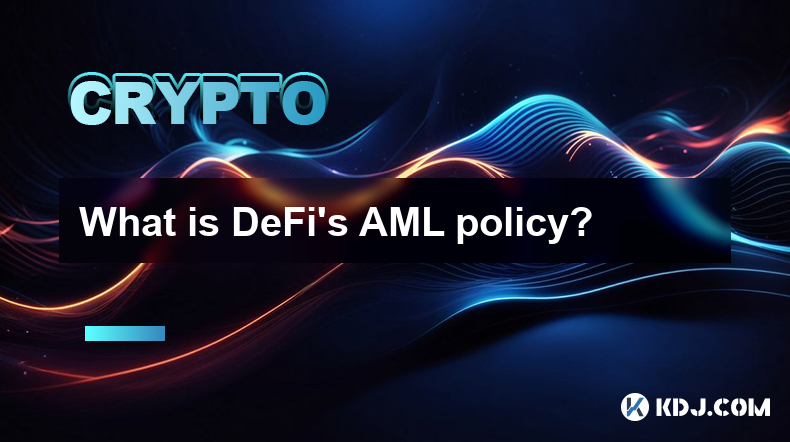
DeFi's AML Policy: Enhancing Compliance in the Crypto Ecosystem
Key Points:
- Understanding the Need for AML/CFT Compliance in DeFi
- Challenges and Limitations of DeFi AML Policies
- Decentralized Identity and Verification Solutions
- Smart Contract Optimization for AML Enforcement
- Collaboration with Regulators and Law Enforcement
Understanding the Need for AML/CFT Compliance in DeFi
Decentralized finance (DeFi) has emerged as a transformative force in the financial landscape, offering innovative solutions for various financial services. However, with its decentralized and pseudonymous nature, DeFi also poses challenges for anti-money laundering (AML) and counter-terrorist financing (CFT) compliance.
- Increased Risk of Illicit Activities: DeFi platforms can provide a channel for criminals to launder illicit funds, as transactions lack the same level of oversight as traditional financial systems.
- Decentralized Nature: The absence of centralized authorities in DeFi makes it difficult to implement and enforce AML/CFT policies effectively.
- Pseudonymity: Many DeFi platforms allow users to remain anonymous, creating difficulties in identifying and verifying users for AML/CFT purposes.
Challenges and Limitations of DeFi AML Policies
Implementing effective AML/CFT policies in DeFi presents several challenges:
- Lack of Regulation: The decentralized nature of DeFi makes it challenging to implement and enforce universal AML/CFT regulations across different jurisdictions.
- Limited Data Access: DeFi platforms often operate on open networks, making it difficult for exchanges to collect and share user data necessary for AML/CFT compliance.
- Technological Constraints: The technological limitations of some DeFi protocols can hinder the implementation of robust AML/CFT mechanisms.
Decentralized Identity and Verification Solutions
To address the challenges of DeFi AML compliance, decentralized identity (DID) and verification solutions offer promising possibilities:
- Establishing True Decentralized Identity: DIDs leverage blockchain technology to create digital identities that are verifiable and tamper-proof, allowing DeFi users to establish their identities without relying on centralized authorities.
- AML-Compliant Verification: DID solutions can be integrated with AML/CFT compliance procedures, enabling DeFi platforms to verify user identities in a decentralized and compliant manner.
- Risk-Based Approach: DIDs can facilitate a risk-based approach to AML/CFT compliance, allowing DeFi platforms to prioritize high-risk transactions for additional scrutiny.
Smart Contract Optimization for AML Enforcement
Smart contracts play a crucial role in DeFi, and optimizing their design and implementation can enhance AML enforcement capabilities:
- AML-Specific Clauses: Smart contracts can be embedded with AML-specific clauses that automatically trigger compliance actions based on predefined parameters.
- Transaction Monitoring: Smart contracts can be used to implement real-time monitoring of transactions, flagging suspicious activities for further investigation.
- Blacklist Integration: Smart contracts can be integrated with blacklist databases to prevent transactions involving known illicit actors.
Collaboration with Regulators and Law Enforcement
Collaboration with regulators and law enforcement agencies is essential to enhance AML/CFT compliance in DeFi:
- Regulatory Guidance: Regulators can provide clear guidance on AML/CFT compliance expectations in the DeFi sector, ensuring that platforms operate in compliance with the law.
- Inter-Agency Cooperation: Law enforcement agencies can work with DeFi platforms to share information and intelligence on illicit activities, facilitating proactive compliance measures.
- Joint Training and Capacity Building: Regulators and law enforcement can provide training and capacity building to DeFi platform operators, enhancing their understanding of AML/CFT requirements.
FAQs
Q: How can DeFi platforms balance compliance with decentralization principles?
A: DeFi platforms can adopt decentralized identity and verification solutions, optimize smart contracts for AML enforcement, and collaborate with regulators and law enforcement agencies to balance compliance with decentralization.
Q: What are the specific challenges faced by AMM and DEX platforms in implementing AML/CFT policies?
A: AMM and DEX platforms face challenges due to their decentralized nature, limited data access, and fast-paced transaction environment. AML-specific smart contracts, risk-based monitoring, and decentralized identity solutions can help address these challenges.
Q: How can decentralized identity solutions improve AML/CFT compliance in DeFi?
A: Decentralized identity solutions offer tamper-proof and verifiable digital identities, enabling DeFi users to establish their identities without relying on centralized authorities. This facilitates risk-based compliance and improves the effectiveness of AML/CFT measures.
Q: Is there a single, comprehensive AML/CFT framework for DeFi?
A: Currently, there is no universal AML/CFT framework specifically designed for DeFi. However, industry-led initiatives and regulatory guidance are emerging to address this need.
Q: How does smart contract optimization help in AML enforcement for DeFi platforms?
A: Smart contracts can be optimized to implement AML-specific clauses, monitor transactions in real-time, and integrate with blacklist databases. This allows for proactive AML enforcement and enhances the platform's compliance capabilities.
Disclaimer:info@kdj.com
The information provided is not trading advice. kdj.com does not assume any responsibility for any investments made based on the information provided in this article. Cryptocurrencies are highly volatile and it is highly recommended that you invest with caution after thorough research!
If you believe that the content used on this website infringes your copyright, please contact us immediately (info@kdj.com) and we will delete it promptly.
- Mutuum Finance (MUTM): A New Contender in the Crypto Market Priced Below $0.02 Is Rapidly Gaining Ground
- 2025-02-21 21:35:24
- Panshibi (SHIBI) gains momentum as the most anticipated meme coin for 2025
- 2025-02-21 21:35:24
- Can Ozak AI (OZ) Surpass Meme Coins Like Shiba Inu (SHIB) and Dogecoin (DOGE) in Profits by 2025?
- 2025-02-21 21:35:24
- American Citizens May Soon Receive a $5K 'DOGE Dividend' From the U.S. Government
- 2025-02-21 21:35:24
- PepeGPT ($PEPEAI) – The AI-Powered Meme Coin Primed to Explode 100x
- 2025-02-21 21:35:24
- Dogecoin News Spread a Significant Movement, Which Caused Strong Reactions Among Cryptocurrency Enthusiasts
- 2025-02-21 21:25:24
Related knowledge
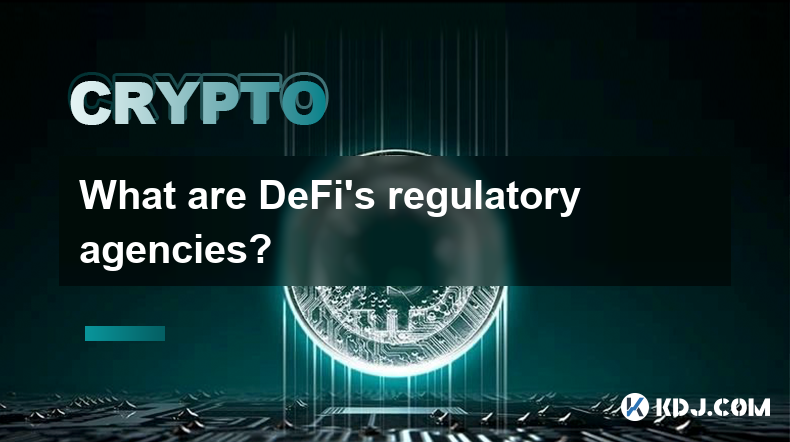
What are DeFi's regulatory agencies?
Feb 16,2025 at 05:18am
Key Points:DeFi: Definition, Architecture, and Regulatory ChallengesRole of Decentralized Autonomous Organizations (DAOs) in Self-RegulationLegal Frameworks for DeFi in the United States and European UnionInternational Cooperation and the Global DeFi Regulatory LandscapeJurisdictional Issues and Considerations for DeFi EntitiesEnforcement Actions and Li...
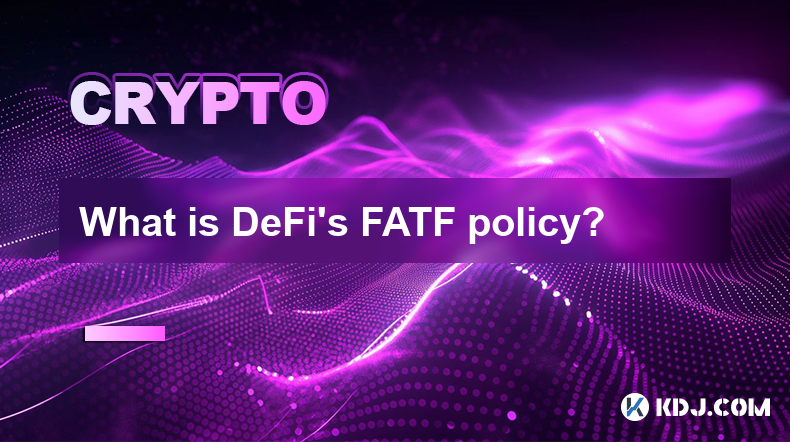
What is DeFi's FATF policy?
Feb 17,2025 at 08:06am
DeFi's FATF Policy: A Comprehensive GuideKey Points:FATF's Definition of Virtual Assets and VASPsFATF's Recommendations for DeFi PlatformsFATF's Travel Rule and its Implementation in DeFiThe Impact of FATF's Policy on DeFi AdoptionFAQs about DeFi's FATF PolicyFATF's Definition of Virtual Assets and VASPsThe Financial Action Task Force (FATF) is an inter...
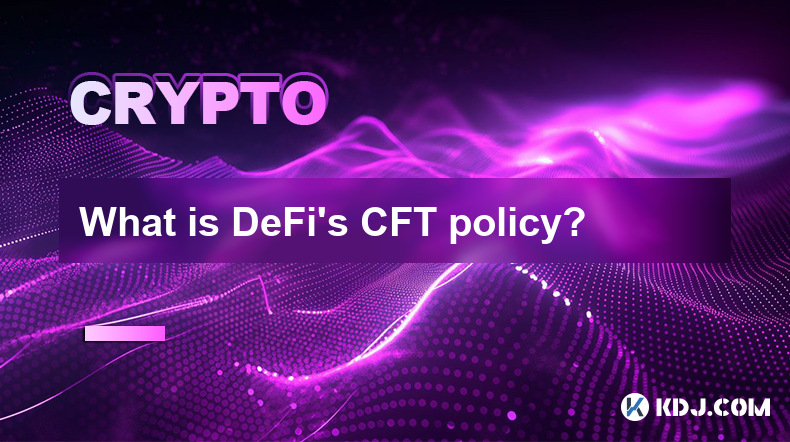
What is DeFi's CFT policy?
Feb 16,2025 at 11:54am
Key Points:Understanding CFT and its Significance in DeFiRegulatory Framework and KYC in DeFiImplementing AML/CFT Measures in DeFiProtocolsRole of Smart Contracts and Blockchain AnalysisChallenges and Future Developments in DeFi's CFT PolicyUnderstanding CFT and its Significance in DeFiCounter-Financing of Terrorism (CFT) is a crucial aspect of the cryp...

What is DeFi's AML policy?
Feb 15,2025 at 07:48pm
DeFi's AML Policy: Enhancing Compliance in the Crypto EcosystemKey Points:Understanding the Need for AML/CFT Compliance in DeFiChallenges and Limitations of DeFi AML PoliciesDecentralized Identity and Verification SolutionsSmart Contract Optimization for AML EnforcementCollaboration with Regulators and Law EnforcementUnderstanding the Need for AML/CFT C...
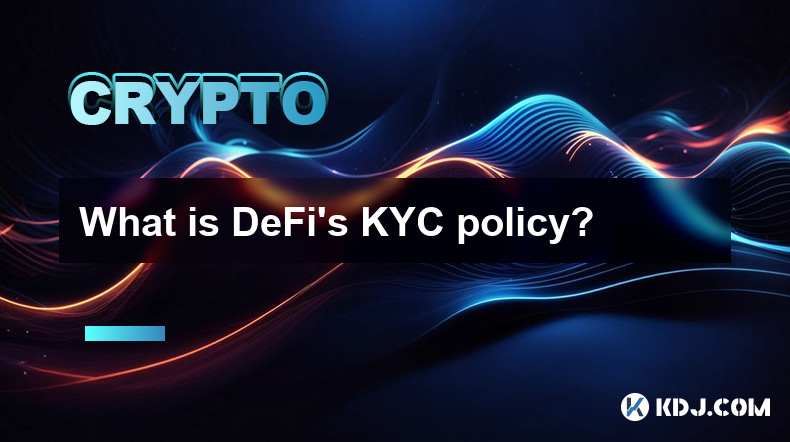
What is DeFi's KYC policy?
Feb 16,2025 at 03:51pm
Key Points:Understanding Decentralized Finance (DeFi)KYC Verification in DeFiBenefits and Drawbacks of KYC in DeFiNotable KYC-Compliant DeFi ProjectsTrends and Future of KYC in DeFiWhat is DeFi's KYC Policy?Decentralized Finance (DeFi) refers to a transformative financial ecosystem that operates on decentralized blockchain networks. Unlike traditional f...
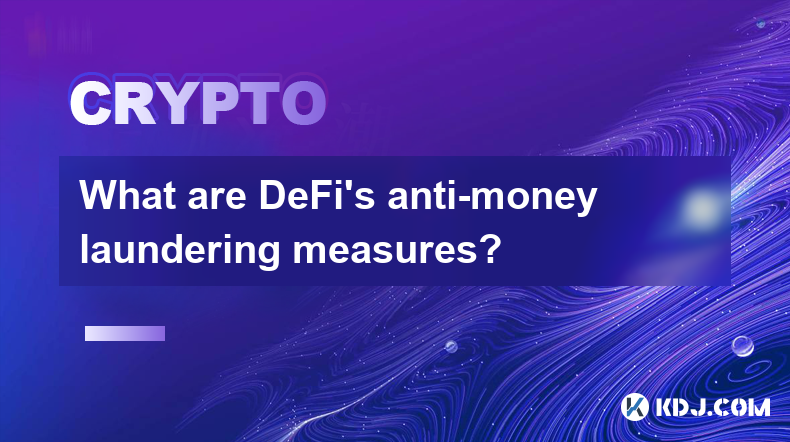
What are DeFi's anti-money laundering measures?
Feb 17,2025 at 07:19pm
Understanding DeFi's Anti-Money Laundering MeasuresKey Points:DeFi platforms utilize decentralized and pseudonymized transactions, posing unique challenges for AML compliance.Regulatory bodies are stepping up efforts to enforce AML regulations within the DeFi space.Various approaches and technologies are employed to combat money laundering in DeFi, incl...

What are DeFi's regulatory agencies?
Feb 16,2025 at 05:18am
Key Points:DeFi: Definition, Architecture, and Regulatory ChallengesRole of Decentralized Autonomous Organizations (DAOs) in Self-RegulationLegal Frameworks for DeFi in the United States and European UnionInternational Cooperation and the Global DeFi Regulatory LandscapeJurisdictional Issues and Considerations for DeFi EntitiesEnforcement Actions and Li...

What is DeFi's FATF policy?
Feb 17,2025 at 08:06am
DeFi's FATF Policy: A Comprehensive GuideKey Points:FATF's Definition of Virtual Assets and VASPsFATF's Recommendations for DeFi PlatformsFATF's Travel Rule and its Implementation in DeFiThe Impact of FATF's Policy on DeFi AdoptionFAQs about DeFi's FATF PolicyFATF's Definition of Virtual Assets and VASPsThe Financial Action Task Force (FATF) is an inter...

What is DeFi's CFT policy?
Feb 16,2025 at 11:54am
Key Points:Understanding CFT and its Significance in DeFiRegulatory Framework and KYC in DeFiImplementing AML/CFT Measures in DeFiProtocolsRole of Smart Contracts and Blockchain AnalysisChallenges and Future Developments in DeFi's CFT PolicyUnderstanding CFT and its Significance in DeFiCounter-Financing of Terrorism (CFT) is a crucial aspect of the cryp...

What is DeFi's AML policy?
Feb 15,2025 at 07:48pm
DeFi's AML Policy: Enhancing Compliance in the Crypto EcosystemKey Points:Understanding the Need for AML/CFT Compliance in DeFiChallenges and Limitations of DeFi AML PoliciesDecentralized Identity and Verification SolutionsSmart Contract Optimization for AML EnforcementCollaboration with Regulators and Law EnforcementUnderstanding the Need for AML/CFT C...

What is DeFi's KYC policy?
Feb 16,2025 at 03:51pm
Key Points:Understanding Decentralized Finance (DeFi)KYC Verification in DeFiBenefits and Drawbacks of KYC in DeFiNotable KYC-Compliant DeFi ProjectsTrends and Future of KYC in DeFiWhat is DeFi's KYC Policy?Decentralized Finance (DeFi) refers to a transformative financial ecosystem that operates on decentralized blockchain networks. Unlike traditional f...

What are DeFi's anti-money laundering measures?
Feb 17,2025 at 07:19pm
Understanding DeFi's Anti-Money Laundering MeasuresKey Points:DeFi platforms utilize decentralized and pseudonymized transactions, posing unique challenges for AML compliance.Regulatory bodies are stepping up efforts to enforce AML regulations within the DeFi space.Various approaches and technologies are employed to combat money laundering in DeFi, incl...
See all articles





















































































